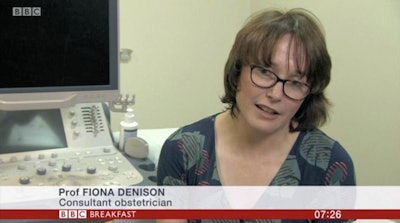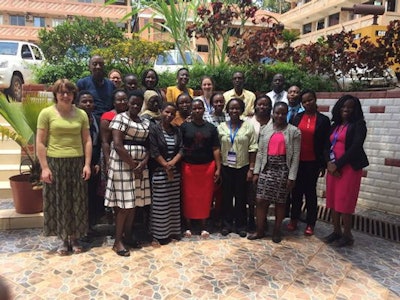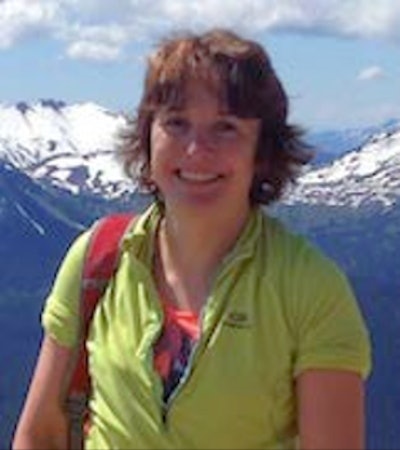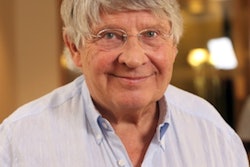
Prof. Fiona Denison, an obstetrician who had a keen interest in ultrasound, multidisciplinary research, and global health, died on 9 January after contracting COVID-19, according to a statement by the Edinburgh Medical School and reports in the national media.
In a tweet posted on 11 January, the Edinburgh Medical School stated: "We are very saddened at the passing of our much-loved colleague, Professor Fiona Denison. Fiona touched many lives -- as a caring clinician, an inspiring teacher, and a passionate researcher. Her loss will be felt greatly by all who knew her, and our thoughts are with her family."
 Fiona Denison is shown here during a June 2019 TV interview with BBC News about the importance of multidisciplinary specialist care and support for obese women during pregnancy.
Fiona Denison is shown here during a June 2019 TV interview with BBC News about the importance of multidisciplinary specialist care and support for obese women during pregnancy.Her brother Dr. Alan Denison, a consultant radiologist at National Health Service (NHS) Grampian and dean of postgraduate medicine at NHS Education for Scotland, issued the first tribute to his sister on social media on 10 January, according to an article posted by the Daily Record.
"My sister Fiona Denison died yesterday following a long battle with COVID," he is quoted as saying. "A gifted, kind and compassionate obstetrician, researcher, teacher, academic, musician, friend, wife, mother, auntie and daughter. RIP."
Born in 1970, she spent half her work time as a consultant obstetrician and half as a reader in maternal and fetal health at Edinburgh's Medical Research Council (MRC) Centre for Reproductive Health. She was principal investigator for the Edinburgh Tommy's Centre for Maternal and Fetal Health, a research unit focusing on maternal obesity.
Fiona became a reader/honorary consultant in maternal and fetal health at the University of Edinburgh in 2014, and then professor of translational obstetrics at the MRC Centre for Reproductive Health, University of Edinburgh, in August 2018.
She had a particular interest in ultrasound guidance in regional anesthesia, and she conducted a study involving the integration of an ultrasound needle to facilitate placement of regional anesthesia in obese pregnant women.
"The overarching aim of my global health research programme is to reduce maternal and offspring outcomes for morbidity and mortality in low and middle income countries," she noted in her bio on the university website. "Most of my research activities are in Uganda, where I have several research studies focused on capacity building research and translational expertise in technologies and healthcare to improve maternal and offspring outcomes."
 Fiona Denison had a keen interest in global health, particularly Uganda. Image courtesy of University of Edinburgh.
Fiona Denison had a keen interest in global health, particularly Uganda. Image courtesy of University of Edinburgh.Fiona also led a study to explore the feasibility of delivering developmental care to preterm neonates with partners in Uganda and Malawi.
Referring to herself as a clinician scientist, she noted that her work was multidisciplinary and translational, the main theme being to optimize maternal, fetal, and healthcare outcomes.
Fiona had an expanding portfolio of interdisciplinary research projects, which traverse the traditional barriers between engineering and clinical application, and she was developing a range of different devices and diagnostics to improve health outcomes, continued her university bio. These ranged from simple devices to improve viewing of the birthing process to more developmental projects that are at proof-of-concept stage, including fetal biosensing to in vivo placental spectroscopy to identify the failing placenta within the womb.
 Translational and interdisciplinary research was a special motivation for Fiona Denison. Image courtesy of University of Edinburgh.
Translational and interdisciplinary research was a special motivation for Fiona Denison. Image courtesy of University of Edinburgh.She worked with a range of colleagues from an engineering, textile, and social science background from institutions such as Heriot Watt and the University of Edinburgh.
She was vice chair of the U.K. National Institute for Clinical Excellence (NICE) Medical Technology Appraisal committee, which oversees end-stage devices that are in early-stage trials with a view to generating recommendations for national adoption within the healthcare system.
According to a 10 January report in the Herald, Fiona recognized that many babies die during or shortly after childbirth due to gaps in the monitoring process and led a project to develop medical devices to try to improve processes. Her contributions have improved health outcomes for mothers and babies here in Scotland and beyond, the article stated.
She was also the chief executive of Birthing Solutions and created a mirror to help midwives and new mothers view the birthing process more easily and for which she won a number of awards. She was a finalist in the 2013 NHS Lothian Health Hero awards, nominated by one of her patients for her concern for patient wellbeing.
According to a tweet by the Centre of Design, Innovation and Translational Excellence (CITE) in Mulago, Kampala, Uganda, "We are going to miss her so much here in Uganda. She was building a strong team to improve maternal and child health through medical device innovations. Rest well Fiona. CITE will miss you."
Editor's note: Since this article was written on 11 January, an update has been posted by the Scottish Herald about the circumstances surrounding the death of Fiona. Her family is keen that the full details are made available.



















